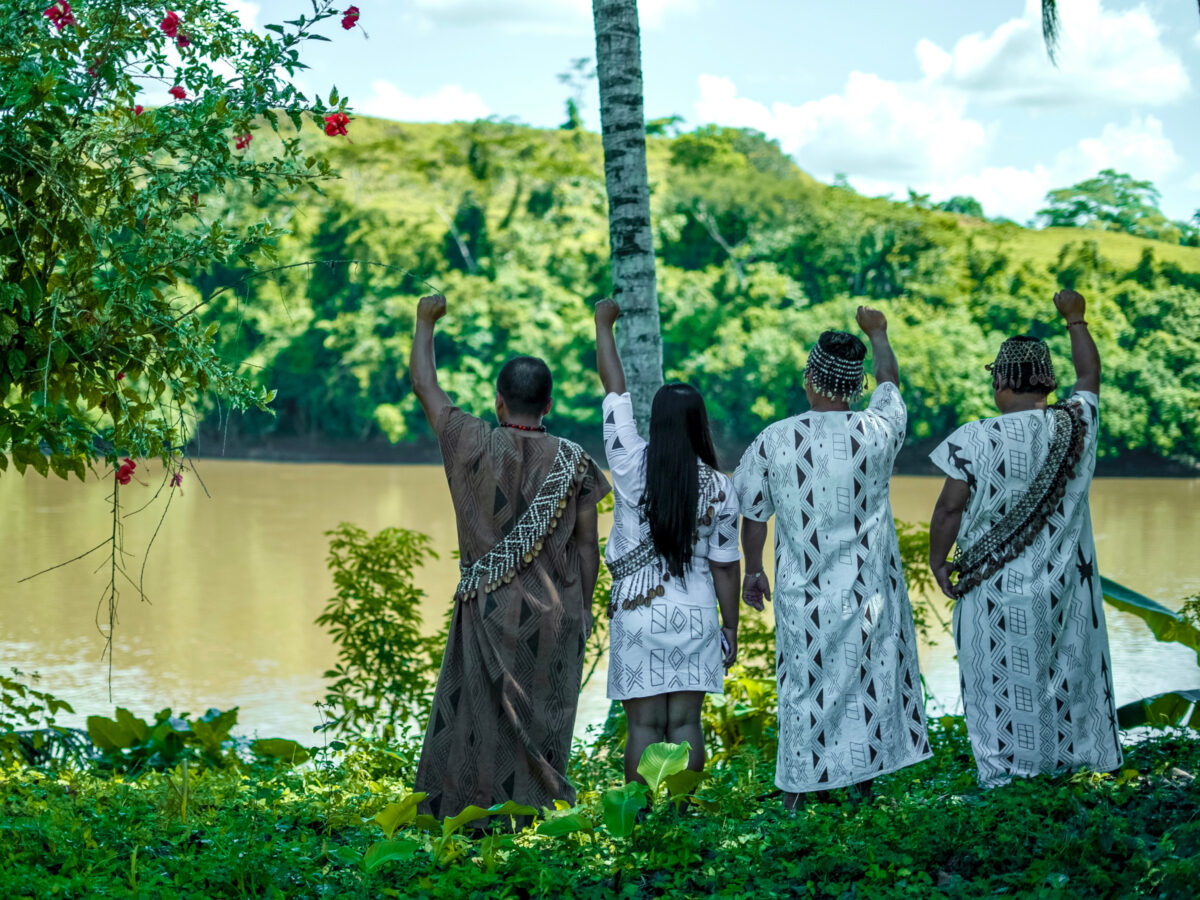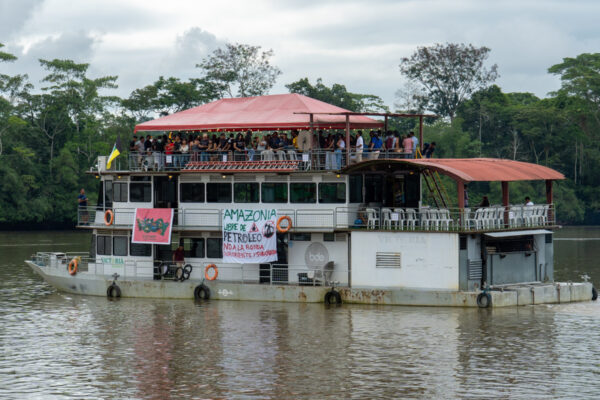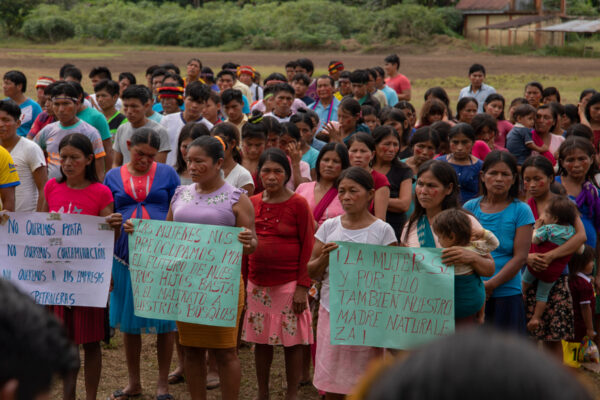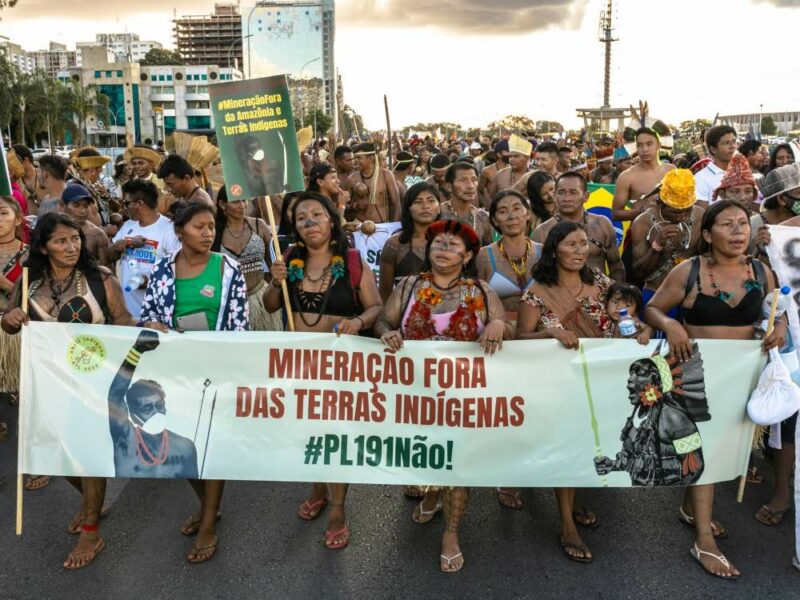Over the past four years, Amazon Watch’s campaign in solidarity with the Kakataibo people has become a powerful example of how organized Indigenous resistance can confront not only criminal economies, but also systemic governmental decay. What began as a call for justice after the assassination of community leader Arbildo Meléndez in 2020 has evolved into a long-term alliance for protection, land rights, and survival in a country where political and institutional collapse now fuels the expansion of illicit economies.
As national Indigenous organizations like AIDESEP have recently denounced, the Peruvian government has been “taken by a mafia” – an entrenched network of corruption that undermines democracy, weakens environmental and territorial protections, and exposes Indigenous defenders to even greater risk. Amid this climate of impunity, the Kakataibo people’s fight to defend their forests from land traffickers, coca growers, and illegal miners stands as a living alternative to state abandonment and complicity.
Hard-won victories in defense of life and territory
In recent years, organized crime in Peru has grown rapidly, spreading its control over sectors like gold mining and transport. The country saw a record number of homicides in 2024 – the highest in at least seven years – many tied to criminal networks. Reports of extortion also hit record levels in 2023 and stayed high through 2025.
While similar trends are seen across Latin America and the Caribbean, Peru stands out because of particularly favorable conditions for these groups: a dysfunctional congress that has weakened laws intended to curb organized crime, and an ineffective executive branch that has failed to respond decisively.
In this context the Kakataibo have been facing a new form of violent colonization, driven by transnational criminal networks seeking to control the rainforest through illicit economies, intimidation, and corruption. Despite the growing insecurity, they have turned ancestral systems of self-governance into modern strategies of territorial control – creating Indigenous Guards, coordinating community patrols, and forging alliances with national and international organizations to secure their territories. These acts of collective courage have prevented further forest invasions, even as six leaders have been killed in recent years.
Thanks to persistent organizing and campaigning, the Peruvian government created a conflict-resolution roundtable with four communities affected by illegal coca cultivation, including Unipacuyacu, the emblematic community where the first assassinations took place. In this space, nearly unheard of in areas dominated by criminal networks, three communities managed to mark and defend their borders against illegal settlements, a rare precedent in regions consumed by corruption and violence.
In these negotiations, the Kakataibo succeeded in getting three out of the four communities to officially mark and defend their borders against illegal settlements. This is a remarkable precedent given the entrenched corruption and lack of political will that have allowed illegal coca growers to advance for decades.
As this struggle has been met with violence and threats by the networks of land invaders, supporting the Kakataibo leaders’ protection has been essential. Through our Amazon Defenders Fund, we’ve secured direct support for personal security measures for nearly a dozen Indigenous leaders facing constant death threats. These funds allowed community defenders to maintain surveillance systems, relocate temporarily when necessary, and continue their work.
A setback that reveals the ongoing struggle
In these hostile conditions, the Kakataibo leaders managed to make progress by delivering thousands of signatures to national and regional authorities, securing limited state actions against illegal coca, and maintaining their commitment to territory and life. Their resilience, amid an atmosphere of political repression and insecurity, reinforces the truth that the most effective response to criminal economies is not militarization or impunity, but the recognition and strengthening of Indigenous territorial rights.
None of this would have been possible without the solidarity of thousands of supporters who signed petitions, sent emails to Peruvian authorities, and shared the Kakataibo’s story across their networks. Each action helped amplify the voices of Indigenous defenders who continue to risk their lives to protect one of the most biodiverse regions on Earth.
Yet the structural crisis persists. The government excluded Unipacuyacu from its official list for land titling, a decision that exposes its lack of seriousness. This setback is emblematic of the broader institutional collapse that Indigenous organizations across Peru are now confronting.
The Kakataibo have made it clear to us: they will not give up. Their fight to reclaim and defend their ancestral lands has lasted more than two decades, and this is simply another chapter in a long struggle for survival and justice. This month thousands of signatures were delivered to the local and national authorities insisting that the Kakataibo land titling needs to continue.
This next stage of the campaign will also build on the professional and dedicated work of our allies in Peruvian civil society, whose collaboration has been vital in advancing legal advocacy, field coordination, and the safety of Indigenous defenders. We are proud to continue this alliance as we relaunch the campaign and work side by side to ensure that justice and protection reach every Kakataibo community.
While the risks remain high, so does the determination to resist. Recent government eradication operations in Kakataibo territory show that our collective pressure is making a difference, but the work is far from over.
The Kakataibo’s experience offers a close look to Amazonian peoples confronting the convergence of crime, corruption, and governmental neglect. Their self protection strategies, local governance, and territorial defense embodies the alternative to criminal economies taking over.
To be sustained and scaled up, it must be embraced and supported by governments and the international community. This is even more urgent as the current political crisis gripping Peru, and much of Latin America, is not a passing moment but a deeper shift likely to endure in the years ahead.














